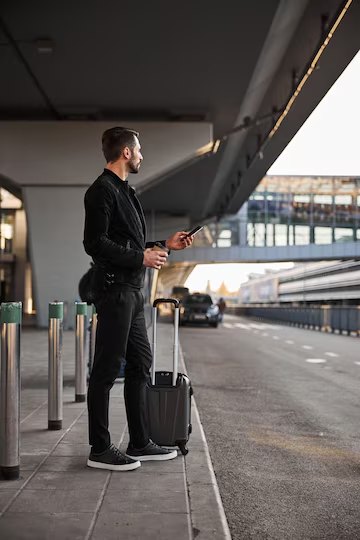A Schengen Business Visa for Germany is a type of short-term visa that allows the holder to enter Germany and other Schengen Area countries for the purpose of engaging in business activities such as meetings, negotiations, or contract discussions.
Germany is one of the top destinations for businesspeople from around the world, whether for conducting business negotiations, attending conferences or meetings, or exploring business opportunities in the German market. To carry out these activities, many businesspeople need to obtain a Schengen Business Visa, which grants them entry into Germany for their professional activities. This article aims to review all aspects of obtaining a Schengen Business Visa for Germany, including requirements, necessary documents, procedures, and permitted activities.
Germany Schengen visa for businessmen
The Schengen Visa is a type of short-term visa that allows the holder to travel freely within the Schengen Area, which includes 27 European countries. The Schengen Business Visa is specifically for those planning to stay in Germany for a short time to engage in business activities such as negotiations, attending conferences, or visiting trade fairs. This visa is subject to several criteria and requirements that applicants must meet.
What is a Schengen Visa?
A Schengen Visa is a travel document that allows the holder to enter all Schengen Area countries without requiring multiple visas. The Schengen Area was established in 1995 to enhance cooperation between European countries in the fields of travel and trade.
Purpose of the Schengen Business Visa
This visa allows the holder to enter Schengen Area countries for business purposes only, such as attending meetings, signing contracts, or negotiating agreements. This visa is not intended for tourism or employment in Germany.
Visa Requirements Schengen visa for businessmen:
Documents and Conditions
To apply for a Schengen Business Visa to Germany, applicants must submit a range of documents that demonstrate the purpose of their trip and their financial ability to cover their stay.
Essential Documents Required
- Visa Application Form: The Schengen visa application form must be completed accurately and signed.
- Photographs: Two recent passport-sized photographs that meet the specifications required by the embassy.
- Valid Passport: The passport must be valid for at least three months after the date of return from Germany.
- Invitation Letter: Applicants must provide an invitation letter from the German company or organization they will be meeting with. The letter should detail the purpose of the trip, specific dates, and location of the meeting.
- Hotel Booking or Proof of Accommodation: Applicants must provide confirmation of their hotel reservation or another form of accommodation.
- Proof of Employment: A letter from the employer or company where the applicant works, confirming employment and business activities.
- Proof of Financial Means: Applicants must demonstrate their financial ability to cover the costs of their stay in Germany, such as through a bank statement.
- Travel Health Insurance: Applicants must provide proof of travel health insurance that covers the duration of their stay in the Schengen Area.
Basic Conditions for Obtaining a Business Visa
Applicants must be in good health and able to demonstrate their ability to cover travel and accommodation expenses. They should also have a clean travel history and not pose a threat to security or order in the Schengen Area.
Detailed Procedures for Obtaining a Schengen Business Visa
The process begins with submitting a visa application at the German embassy, consulate, or authorized application centers. The procedure involves several sequential steps.
- Apply Early
It is advisable to submit the visa application well in advance of the planned travel date. The German embassy or consulate typically recommends submitting the application at least three months before the planned travel date. - Complete the Form
The visa application form must be filled out accurately and correctly, and all required documents must be submitted according to the embassy’s specifications. - Pay the Fees
The visa fee is paid at the time of application. This fee is non-refundable, even if the visa is denied. - Interview
In some cases, you may be required to attend an in-person interview at the embassy to clarify the purpose of your trip. You should be prepared to answer questions related to the business activities you will be undertaking in Germany. - Wait for Processing
Visa processing usually takes around 10 to 15 business days. Processing may take longer in certain cases, such as if there is a need to verify information or documents. - Receive the Visa
If your application is approved, you will be granted a Schengen Business Visa, allowing you to enter Germany and other countries in the Schengen Area.
Permitted Activities Under the Schengen Business Visa
The Schengen Business Visa is intended only for specific business activities, such as:
- Attending Conferences and Trade Fairs: Visa holders can attend business-related events in Germany.
- Business Meetings: Visa holders can participate in meetings and negotiations with business partners or clients.
- Visiting Companies: Visa holders can visit German companies to explore their products or services.
Activities Not Allowed
- Paid Employment: Schengen Business Visa holders are not permitted to engage in paid employment or receive wages while in Germany.
- Long-Term Stay: The visa holder is not allowed to stay in Germany or any Schengen country for more than 90 days within a 180-day period.
Practical Tips for Business Applicants Seeking a Schengen Visa
- Plan Ahead: It is recommended to plan the business trip carefully, setting up meetings and deadlines in advance.
- Keep Copies of Documents: It is advisable to keep copies of all submitted documents, including the invitation letter, hotel bookings, and financial documents.
- Apply Early: Given the time it may take to process visa applications, it is advisable to apply well before the intended travel date
What to do if your visa is denied?
If your visa application is denied, you can appeal the decision or reapply by submitting additional documents to clarify your situation.
The Schengen Business Visa to Germany is a key gateway for professionals who want to expand into new markets or strengthen their business relationships in Germany. With good preparation and following the procedures accurately, businesspeople can obtain this visa easily and without issues.
How to Obtain a German Business Visa (Geschäftsvisum)
The German Business Visa (Geschäftsvisum) is specifically for individuals intending to travel to Germany for specific business purposes. The process of obtaining it requires following precise steps and submitting specific documents:
- Define the Purpose of the Business Trip: You must have a clear and specific reason for your business trip to Germany. This can include attending meetings, conferences, trade fairs, contract negotiations, short-term professional training, or other business-related activities. These activities must be of a temporary nature.
- Obtain an Invitation Letter (Einladungsschreiben): The invitation letter is one of the most crucial documents. It must be issued by the German company or institution you will be dealing with or visiting. The letter should include details about:
- Your full name, date of birth, nationality, and passport number.
- The specific purpose of the business visit.
- The dates and duration of the visit.
- Details of the inviting company or institution (name, address, contact person, contact information).
- Confirmation of who will cover the costs of accommodation and living expenses, or clarification of the visitor's responsibility.
- Prepare the Required Documents: In addition to the invitation letter, you will need to prepare a set of other documents, which may include:
- Valid Passport: It must be valid for at least three months beyond the intended stay and have at least two blank pages.
- Visa Application Form: The form must be completed accurately and signed. It can be obtained from the German Embassy or Consulate website.
- Recent Passport-Sized Photographs: These must meet specific biometric requirements.
- Proof of Civil Status: Such as a marriage certificate (if applicable).
- Cover Letter (Begleitschreiben): A personal letter explaining the purpose of your business trip in detail, travel dates, and the entities you will be dealing with.
- Proof of Employment/Business Activity in Your Home Country: Such as a commercial register, tax card, a letter from your employer stating your position and the purpose of travel, or other documents proving your business nature.
- Proof of Financial Means: Recent bank statements (for the last three to six months) demonstrating your ability to cover your accommodation and travel expenses. You may also be required to provide proof of travel insurance covering medical expenses and emergencies.
- Travel Arrangements: Round-trip flight tickets (it is advisable not to purchase them before visa approval).
- Hotel Booking or Proof of Accommodation: Evidence of where you will be staying in Germany.
- Submit the Application at the German Embassy or Consulate: You must schedule an appointment in advance to submit your visa application in person at the German Embassy or Consulate in your country. During the appointment, your documents will be reviewed, your fingerprints will be taken (if necessary), and you may be interviewed.
- Pay the Visa Fee: There is a specific fee that must be paid when submitting the application.
- Wait for the Visa Decision: The processing time for a visa application varies, so it is advisable to apply well in advance.
German Visa Acceptance Rate (Schengen Visa Acceptance Rate for Germany)
There is no official and specific acceptance rate published for the German Schengen visa in general or for the business visa in particular. The acceptance rate depends significantly on several factors, including:
- Completeness and Accuracy of Submitted Documents: Providing all required documents completely and accurately significantly increases the chances of approval. Any missing or conflicting information may lead to rejection.
- Clear and Convincing Purpose of Visit: The business purpose must be clear, well-documented, logical, and acceptable to the German authorities.
- Financial Status of the Applicant: You must prove your ability to cover your accommodation and travel costs without needing to rely on public funds in Germany.
- Ties to the Country of Residence: You need to demonstrate strong ties to your home country (such as employment, family, property) that indicate your intention to return after your visit.
- Criminal Record: Any criminal record may negatively impact the visa decision.
- Assessment of Security and Immigration Risks: German authorities assess each application from a security and immigration perspective.
Generally, if all requirements are met correctly and strong supporting documents for the business purpose of the visit are provided, the chances of obtaining the visa are good. However, it is crucial to remember that the decision to grant the visa rests solely with the German authorities.
Easiest German Schengen Visa (Easiest Type of German Schengen Visa)
There is no specific type of Schengen visa that can be definitively described as the "easiest" to obtain. The ease of obtaining a visa largely depends on the purpose of the visit, the applicant's specific situation, and how well they meet the requirements.
However, it can be argued that visas for clear, specific, and short-term purposes, with a strong supporting entity in Germany, might be relatively smoother to process if all other conditions are met. In the context of your article on business travelers, if you have a strong invitation from a reputable German company, the purpose of the visit is specific and short-term, and you provide all the necessary documents correctly, the process might be relatively straightforward.
It is important to emphasize that there is no "shortcut" or generally "easier" visa. Each type of Schengen visa has its own set of requirements, and applicants must meet these requirements regardless of the visa category they are applying for.
Benefits of the Schengen Business Visa to Germany
- Flexibility in traveling between Schengen countries:
Once you obtain the Schengen Business Visa, you can travel to Germany and other Schengen Area countries (27 countries) without needing additional visas. This allows easy movement within the region to pursue your business activities. - Opportunities for business and commercial expansion:
The Business Visa allows holders to attend conferences and trade fairs, as well as conduct meetings and negotiate business contracts. These opportunities enhance business relationships and contribute to expansion and growth in European markets. - Suitable duration for business activities:
Business visa holders can stay in Germany for up to 90 days within a 180-day period, providing enough time to carry out business activities, from attending meetings to negotiating contracts or promoting products. - Ease of application with proof of business activities:
If you're a business owner or employee of a company and have proof of your involvement in business activities (such as an invitation from a German company or a letter from your employer), applying for the Business Visa is relatively straightforward. - Benefiting from Germany's excellent infrastructure:
Germany is the largest economy in Europe and one of the largest economies globally. Obtaining a Business Visa opens the door to taking advantage of diverse business opportunities in this developed market, including in fields like technology, industry, and financial services.
Drawbacks of the Schengen Business Visa to Germany
- Limited purposes:
The Schengen Business Visa is only for business activities. If you plan to travel for tourism or any other purpose during your visit, this visa won't be suitable. You may need a separate tourist visa if you intend to engage in leisure activities. - Limited stay duration:
While the allowed stay can be up to 90 days within a 180-day period, it may not be sufficient for some businesspeople who need a longer stay. In this case, applying for another type of visa, such as a long-term work visa, may be necessary. - Sometimes complex procedures:
Although applying for a Business Visa can be simple in many cases, the required documents can be complex, such as needing an official invitation letter from German companies or confirmation from your employer. If any documents are missing, the approval process could be delayed. - No permission for paid work in Germany:
Although the visa allows participation in business activities, it does not permit the holder to receive wages or work in Germany. Individuals who wish to engage in paid employment in Germany will need to apply for another type of visa.
Potential rejection if documents are incomplete or inaccurate:
A lack of documents or inaccurate information could result in the rejection of your application. Applications are reviewed carefully, and if there are doubts about the purpose of your trip or the provided documents, the visa may be denied, causing delays or complications in your travel plans.
Costs associated with the visa:
There are non-refundable fees to be paid when applying for the visa, which may pose an additional burden for some individuals. There could also be additional costs, such as the fees for certified document translations or health insurance.
The Schengen Business Visa to Germany offers several benefits related to travel flexibility and valuable business opportunities in the European market. However, it requires careful planning and adherence to specific requirements. For those planning short-term business activities in Germany or the Schengen Area, this visa is an ideal option, but it may sometimes be limited when a longer stay or non-business activities are needed.
Free Work Visa (Kostenloses Arbeitsvisum für Deutschland)
There is no such thing as a "free work visa" for Germany or any other country in the Schengen area. The process of obtaining a work visa always involves paying specific fees to the German Embassy or Consulate when submitting the application. These fees are part of the application processing costs.
Furthermore, to obtain a work visa in Germany, you typically need to have a specific job offer from a German employer. While the employer might cover some costs related to your employment (such as initial approval procedures), you as the applicant will be responsible for paying the visa fees.
There might be instances where a host company covers travel and accommodation costs for a business trip, but this does not mean the business visa itself is "free." The visa application fees remain the responsibility of the applicant.
Relation between Dummy Flight Tummy and the Business Visa to Germany
A Dummy flight Ticket (or preliminary booking) is a key part of the application process for the Schengen Business Visa to Germany and is sometimes a required document. You will typically be asked to provide proof of a preliminary flight booking when submitting your visa application, but this is not a final booking.
What is a Dummy flight Ticket ?
A Dummy Ticket is a non-paid reservation made through airlines or travel agencies. This booking provides you with all the flight details (such as travel dates, flight details, and arrival/departure information), but the ticket price is not paid until the visa is approved. This allows you to show proof of your intended travel without having to pay for the ticket upfront before your visa is granted.
Importance of a Dummy Ticket for the Business Visa to Germany:
Proof of intent to travel:
One of the basic requirements for submitting a Schengen visa application is proving the intent to travel. A Dummy Ticket demonstrates to the embassy or consulate that you plan to travel to Germany on specific dates and that you have a plan to return to your home country after completing your business activities.
Embassy or consulate requirements:
Most German embassies require applicants to submit a preliminary Dummy Ticket as part of their application documents. The Dummy Ticket may not be necessary in every case, but having it can help expedite the process and reduce the risk of visa denial.
Cost savings in case of rejection:
A Dummyt Ticket is a convenient option as it doesn’t require full payment for the ticket. If the visa is denied, you won’t have paid for the ticket, minimizing the costs you might incur.
How to use a Temporary Flight Booking in your Business Visa Application:
Initial Flight Booking Submission: If you need a preliminary flight booking to submit with your visa application, you can make a provisional booking online through airlines or travel agencies that offer this service. You'll need to input your trip details, including travel dates, airport, and arrival/departure locations.
Submit the Dummy Ticket with Visa Documents: Once you have the Dummy Ticket, you can submit it with your Schengen visa application. You can also include other documents such as the invitation letter from the German company, hotel booking, and proof of financial capability.
Benefits of a Dummy Ticket for Businesspeople:
- Cost savings: Since the Dummy Ticket doesn’t require paying for the full ticket upfront, it saves money for businesspeople who might not want to pay for the ticket until after the visa is confirmed.
- Ease of application: A Dummy Ticket helps fulfill the requirements that embassies may ask for during the application phase, making the process smoother.
- Flexibility in adjusting travel plans: If the visa is denied or there are changes to business plans, the Dummy Ticket can be easily modified or canceled without incurring additional costs.
Warnings and Key Points:
- Avoid Dummy bookings: The Dummy Flight Ticket must be genuine and match your travel plans. Some embassies may verify the booking’s authenticity, and if a fake booking is detected, it can result in visa denial.
- Plan your trip: Make sure your travel plans align with the business activities you intend to do in Germany, as embassies may ask for additional details about the purpose of your trip.
A Dummy Flight Ticket is an essential part of the application process for the Schengen Business Visa to Germany, as it’s used to prove your intent to travel and confirm your travel plans. This type of booking allows businesspeople to submit the required travel documents without incurring upfront ticket costs, making it an ideal solution for those applying for short-term visas for business expansion or negotiations in Germany.



